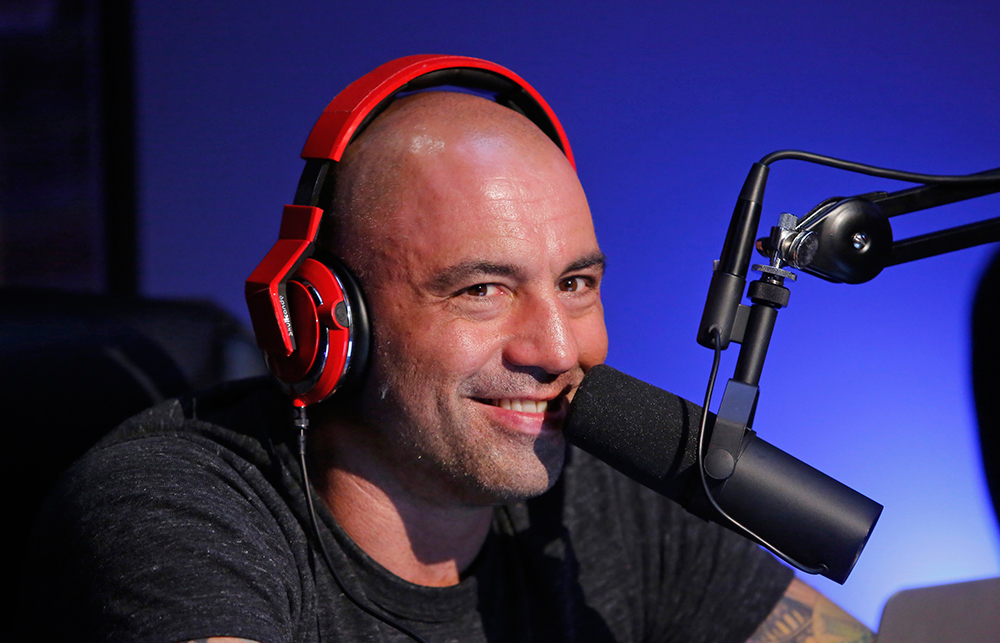
2019年2月,Spotify首席执行官丹尼尔·埃克宣布以3.4亿美元收购播客公司Gimlet和Anchor,并宣称Spotify旨在成为世界领先的音频平台——而不仅仅是音乐领域。他在博客文章《音频优先》中写道,尽管播客业务规模相对较小,但拥有“令人难以置信的增长潜力”。
一年后,播客业的表现依旧平平。根据德勤的报告显示,全球播客市场在2020年预计增长30%,将首次突破10亿美元大关。但和录制音乐及电台广播市场相比,这个数字实在不值一提。录制音乐的收入在2020年预计可达210亿美元,电台广播则将达到420亿美元。
但是,Spotify无需为此感到不安。尽管播客业务的回报微乎其微,却能为这家瑞典公司带来音乐无法提供的东西:原创内容。通过收购Gimlet等内容制作公司,还有后来买下的Parcast和比尔·西蒙斯的网站The Ringer,Spotify可利用播客增加订户数量和广告业绩。
在上周,这一战略迎来了巅峰时刻:该公司与全球最受欢迎的明星播客乔·罗根签订了一份多年期的独家播放协议,据悉价值高达1亿美元。
罗根的播客节目《乔·罗根体验》拥有庞大的听众群,是知名度最高的非媒体类个人播客,在苹果的播客排行榜上长年与榜首仅一步之遥。截至本周三,该节目位居榜单第二。罗根在去年表示,节目的月下载量约为1.9亿次。Spotify希望,从今年秋季独家播放罗根的节目后,能收获来自其他平台的数百万名听众。
此举表明,人们的播客消费方式将发生根本性的转变。安卓的应用商店Google Play和苹果的App Store上有几十个播客应用,而苹果设备的预装播客应用仍是目前使用率最高的一款。通常来说,任意一款应用都能下载和收听播客节目。但如今,业界最知名的播客节目只能在一个平台上收听了,那就是Spotify。
此前,播客的基本商业模式即:播客主尽可能到更多平台上发布节目,借此吸引大量广告商,从打赏和商品销售中赚取额外利润。而现在,Spotify和罗根签订的独播授权协议表明,该行业或将在两个方面发生重大变化:
付费订阅的播客终于要来了?
首先,未来那些最受欢迎的播客都会以付费订阅的方式运营,而不会在公开平台发布。不过这并不是一个全新的概念:去年,初创公司Luminary获得风投支持,将自身定位为“播客界的Netflix”,同时推出了40多个无广告的独播节目,每月订阅费为8美元。该公司筹集了近1亿美元,并向业内一些顶级主播抛出了橄榄枝,比如美国公共广播电台节目主持人、播客节目《我的创业历程》的主播盖伊·拉兹。但该公司成立后,有关广告模式的负面报道也随之而来。被Spotify收入麾下的Gimlet、《纽约时报》等行业中坚力量,以至罗根本人,都拒绝登陆该平台。今年1月,Luminary将订阅费调降至每月5美元。5月初,据彭博社报道,Luminary旗下仅有8万名订阅用户,而且每个月都在亏钱。
Spotify也提供无广告的高级订阅服务。当然,与前者最大的不同之处在于,该服务包含了海量音乐库和精心编排的播放清单。每月10美元的订阅费可让用户同时收听播客和音乐,并结合Spotify颇受欢迎的发现算法发掘新意。Spotify凭借内部的播客公司可继续在订阅服务中提供独播节目,以此催生订阅需求。虽然Spotify表示,有广告的免费用户仍可收听原创节目和罗根的节目,但在未来也可能要求用户付费订阅。Spotify在最近宣布,付费订户已超过1.3亿——对于播客发行商来说,相较Luminary,这个数字更具吸引力。
授权将成为发展方向
Spotify和罗根签约的举动还表明,授权协议可能是播客主未来的发展方向。就像音乐人、电视节目和电影那样,我们可能会看到越来越多的主播把节目独家授权给特定的服务商,类似于电视节目被转售到Netflix、Hulu、亚马逊等平台播放。
罗根与Spotify的交易亦是反常现象。正如音乐作家特德•焦亚所言,一位音乐家的作品需要在Spotify播放230亿次(每次播放的标准报酬为0.437美分),才能和罗根的1亿美元协议相提并论。焦亚写道:“换言之,比起史上任何一位音乐人,Spotify更看重罗根的价值。”
大多数播客主播都无法指望赚取这么高的报酬。但可以肯定的是,有些人已经意识到,在这种独播许可协议下,热门播客原来也能创造如此丰厚的利润。Spotify砸下5亿多美元收购播客和寻求授权,就清楚表明了自己的意图:他们想要攻占播客市场,而且可能还会发起更多同类型的交易。但是,谷歌、亚马逊、苹果等公司可能也会选择加入竞争。
罗根和Spotify签约的消息在播客界掀起了轩然大波,也让独立播客应用的开发者想知道后续会产生何种结果。“乔·罗根迟早会发现,为一个开放、免费的现有节目设立付费墙,势必会流失大量听众,”广受好评的的播客应用Overcast的创办者马尔科·阿蒙特在推特上写道。“我希望他至少能为公众提供节目,如此一来,当Spotify的独播授权失效时,他还可以重回业界。”
目前,外界还需要更多时间才能评估Spotify重金加持播客圈带来的影响。但已让人一目了然的是,该公司非常重视播客领域。这项与最知名播客达成的1亿美元授权交易不仅首开先例,似乎注定还将改变整个行业。(财富中文网)
译者:Emily
2019年2月,Spotify首席执行官丹尼尔·埃克宣布以3.4亿美元收购播客公司Gimlet和Anchor,并宣称Spotify旨在成为世界领先的音频平台——而不仅仅是音乐领域。他在博客文章《音频优先》中写道,尽管播客业务规模相对较小,但拥有“令人难以置信的增长潜力”。
一年后,播客业的表现依旧平平。根据德勤的报告显示,全球播客市场在2020年预计增长30%,将首次突破10亿美元大关。但和录制音乐及电台广播市场相比,这个数字实在不值一提。录制音乐的收入在2020年预计可达210亿美元,电台广播则将达到420亿美元。
但是,Spotify无需为此感到不安。尽管播客业务的回报微乎其微,却能为这家瑞典公司带来音乐无法提供的东西:原创内容。通过收购Gimlet等内容制作公司,还有后来买下的Parcast和比尔·西蒙斯的网站The Ringer,Spotify可利用播客增加订户数量和广告业绩。
在上周,这一战略迎来了巅峰时刻:该公司与全球最受欢迎的明星播客乔·罗根签订了一份多年期的独家播放协议,据悉价值高达1亿美元。
罗根的播客节目《乔·罗根体验》拥有庞大的听众群,是知名度最高的非媒体类个人播客,在苹果的播客排行榜上长年与榜首仅一步之遥。截至本周三,该节目位居榜单第二。罗根在去年表示,节目的月下载量约为1.9亿次。Spotify希望,从今年秋季独家播放罗根的节目后,能收获来自其他平台的数百万名听众。
此举表明,人们的播客消费方式将发生根本性的转变。安卓的应用商店Google Play和苹果的App Store上有几十个播客应用,而苹果设备的预装播客应用仍是目前使用率最高的一款。通常来说,任意一款应用都能下载和收听播客节目。但如今,业界最知名的播客节目只能在一个平台上收听了,那就是Spotify。
此前,播客的基本商业模式即:播客主尽可能到更多平台上发布节目,借此吸引大量广告商,从打赏和商品销售中赚取额外利润。而现在,Spotify和罗根签订的独播授权协议表明,该行业或将在两个方面发生重大变化:
付费订阅的播客终于要来了?
首先,未来那些最受欢迎的播客都会以付费订阅的方式运营,而不会在公开平台发布。不过这并不是一个全新的概念:去年,初创公司Luminary获得风投支持,将自身定位为“播客界的Netflix”,同时推出了40多个无广告的独播节目,每月订阅费为8美元。该公司筹集了近1亿美元,并向业内一些顶级主播抛出了橄榄枝,比如美国公共广播电台节目主持人、播客节目《我的创业历程》的主播盖伊·拉兹。但该公司成立后,有关广告模式的负面报道也随之而来。被Spotify收入麾下的Gimlet、《纽约时报》等行业中坚力量,以至罗根本人,都拒绝登陆该平台。今年1月,Luminary将订阅费调降至每月5美元。5月初,据彭博社报道,Luminary旗下仅有8万名订阅用户,而且每个月都在亏钱。
Spotify也提供无广告的高级订阅服务。当然,与前者最大的不同之处在于,该服务包含了海量音乐库和精心编排的播放清单。每月10美元的订阅费可让用户同时收听播客和音乐,并结合Spotify颇受欢迎的发现算法发掘新意。Spotify凭借内部的播客公司可继续在订阅服务中提供独播节目,以此催生订阅需求。虽然Spotify表示,有广告的免费用户仍可收听原创节目和罗根的节目,但在未来也可能要求用户付费订阅。Spotify在最近宣布,付费订户已超过1.3亿——对于播客发行商来说,相较Luminary,这个数字更具吸引力。
授权将成为发展方向
Spotify和罗根签约的举动还表明,授权协议可能是播客主未来的发展方向。就像音乐人、电视节目和电影那样,我们可能会看到越来越多的主播把节目独家授权给特定的服务商,类似于电视节目被转售到Netflix、Hulu、亚马逊等平台播放。
罗根与Spotify的交易亦是反常现象。正如音乐作家特德•焦亚所言,一位音乐家的作品需要在Spotify播放230亿次(每次播放的标准报酬为0.437美分),才能和罗根的1亿美元协议相提并论。焦亚写道:“换言之,比起史上任何一位音乐人,Spotify更看重罗根的价值。”
大多数播客主播都无法指望赚取这么高的报酬。但可以肯定的是,有些人已经意识到,在这种独播许可协议下,热门播客原来也能创造如此丰厚的利润。Spotify砸下5亿多美元收购播客和寻求授权,就清楚表明了自己的意图:他们想要攻占播客市场,而且可能还会发起更多同类型的交易。但是,谷歌、亚马逊、苹果等公司可能也会选择加入竞争。
罗根和Spotify签约的消息在播客界掀起了轩然大波,也让独立播客应用的开发者想知道后续会产生何种结果。“乔·罗根迟早会发现,为一个开放、免费的现有节目设立付费墙,势必会流失大量听众,”广受好评的的播客应用Overcast的创办者马尔科·阿蒙特在推特上写道。“我希望他至少能为公众提供节目,如此一来,当Spotify的独播授权失效时,他还可以重回业界。”
目前,外界还需要更多时间才能评估Spotify重金加持播客圈带来的影响。但已让人一目了然的是,该公司非常重视播客领域。这项与最知名播客达成的1亿美元授权交易不仅首开先例,似乎注定还将改变整个行业。(财富中文网)
译者:Emily
When Spotify CEO Daniel Ek announced the $340 million acquisition of podcast companies Gimlet and Anchor in February 2019, he declared that Spotify’s mission was to become to the world’s leading audio—not just music—platform. In a blog post titled “Audio-First,” he wrote of the “incredible growth potential” for podcasts despite the business being a relatively small one.
A year later, it’s still modest. The global podcasting market in 2020 is expected to grow 30%, surpassing $1 billion for the first time, according to Deloitte. Recorded music, by contrast, is projected to reach $21 billion; radio comes in at $42 billion. But Spotify won’t be bothered. Despite the minimal returns, podcasts offer the Swedish company something it could never have with music: original content. By acquiring content-creating companies like Gimlet—and later Parcast and Bill Simmons’s The Ringer—Spotify could leverage podcasts to increase subscribers and advertising sales. That strategy culminated this week with an exclusive multiyear deal, reportedly worth $100 million, with the world’s biggest podcast star: Joe Rogan.
Rogan’s podcast, The Joe Rogan Experience, is massive. It consistently ranks near the top of Apple’s podcast charts, perched at No. 2 as of Wednesday. He is the highest-profile individual podcaster not affiliated with a media organization. Rogan last year said the show was being downloaded about 190 million times a month. Spotify will hope that when Rogan’s podcast arrives on its app this fall, the exclusive nature of the show will bring millions of listeners from other platforms to Spotify.
Such an arrangement is a fundamental shift in the way people consume podcasts. There are dozens of podcast apps available on Android’s Google Play and Apple’s App Store, and Apple’s default Podcast app that comes pre-installed on Apple devices remains the most used. Generally, any podcast can be downloaded and listened to on any app. Now, the industry’s biggest name is available on just one: Spotify.
Before, the basic business model for podcasting was to distribute shows on as many platforms as possible. Podcasters could then appeal to more advertisers and generate additional profits from crowdfunding and merchandise sales. Spotify and Rogan’s exclusive licensing deal now suggests that the industry could change in two significant ways:
Subscription-supported podcasts—finally?
First is a future in which major podcasts are subscription-based, rather than available on an open marketplace. This isn’t a new concept: Venture-backed startup Luminary positioned itself as the “Netflix of podcasts” last year, launching with more than 40 exclusive shows without ads for $8 a month. The company raised nearly $100 million and courted some of the industry’s top stars, like NPR’s Guy Raz of How I Built This fame. But the company’s launch accompanied negative press over its advertising model. Industry stalwarts like Spotify’s Gimlet, the New York Times, and eventually Rogan himself, withheld popular shows. In January, Luminary lowered its subscription fee to $5 a month. And earlier in May, Bloomberg reported that Luminary has signed up just 80,000 subscribers and was losing money every month.
Spotify also offers a premium, ad-free subscription. The big difference, of course, is that it includes a vast library of recorded music and curated playlists. A $10 monthly fee will get you podcasts as well as music paired with Spotify’s popular discovery algorithms. With Spotify’s roster of in-house podcast companies, Spotify can continue to funnel exclusive shows to the service, increasing the demand for subscriptions. While Spotify has said free, ad-supported users can still access its original shows, as well as Rogan’s, there’s nothing stopping them from making a premium subscription a requirement in the future. Compared to Luminary, Spotify recently announced it reached more than 130 million paying subscribers—a much more enticing figure to podcast publishers.
Licensing the way forward
Rogan’s deal also shows that licensing agreements may be a way forward for podcasters. Similar to musical artists, television shows, and movies, we might see a future in which more and more podcasters exclusively license their content to particular services, similar to how TV shows move from Netflix to Hulu to Amazon, and so on.
Rogan’s deal with Spotify is an anomaly: As music writer Ted Gioia pointed out, a musician would need to generate 23 billion streams on the service at the standard $.00437 rate per stream to match the $100 million agreement with Rogan. “In other words,” Gioia wrote, “Spotify values Rogan more than any musician in the history of the world.”
Most podcasters can’t expect to earn such a high fee. But it’s safe to assume some are realizing how lucrative a hit podcast can be under this type of exclusive licensing deal. Spotify, having spent well over half a billion dollars on podcast acquisitions and licensing, has made its intentions clear: It wants to own the podcasting market and may have more of these deals up its sleeve. But others—Google, Amazon, Apple, to name a few—may choose to compete.
News of Rogan’s deal sent shock waves through the podcasting community, and it will leave indie podcast app developers wondering what’s next. “What Joe Rogan is going to find out—after it’s too late—is that moving an existing, open, free show behind a proprietary wall results in massive audience loss,” tweeted Marco Arment, creator of the popular podcast app Overcast. “I hope he at least leaves his public feed up so he can return to it when his Spotify exclusivity fails.”
More time will be needed before the true impact of Spotify’s podcast spending spree can be assessed. But what’s already clear is that the company is taking podcasting very seriously. A first-of-its-kind, $100 million deal with the industry’s biggest star seems destined to change the business.






